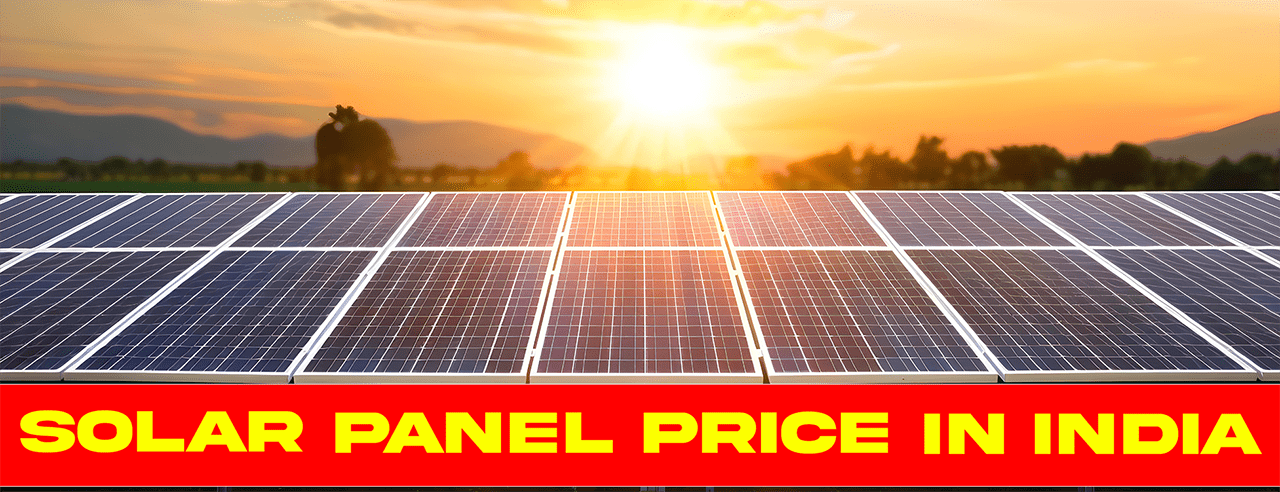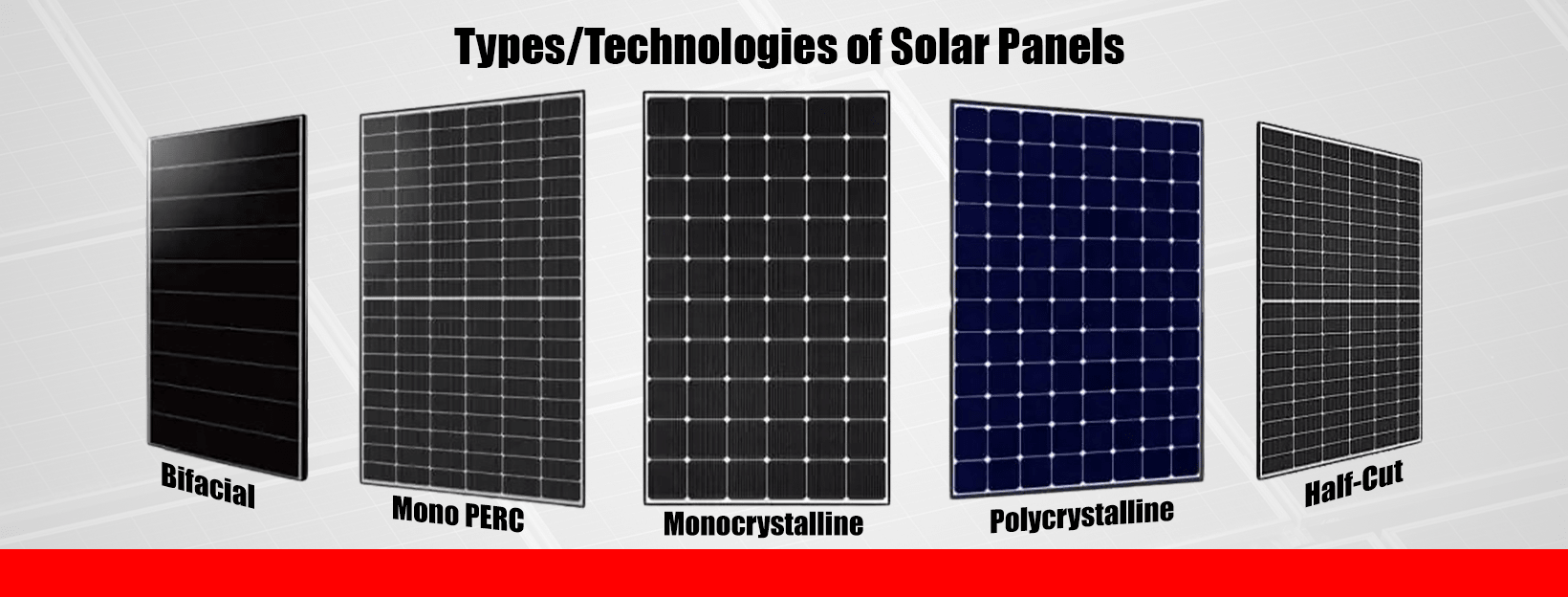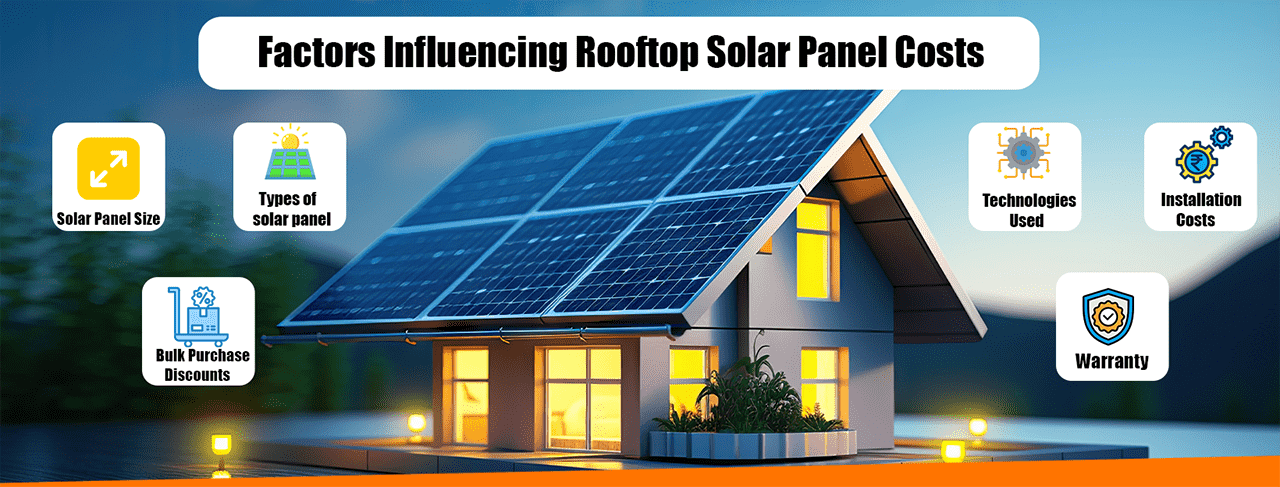Solar Panel Price in India

India is seeing an all time high electricity costs and it becomes worse during summer. Rural areas are struggling with regular power cuts. To solve both the problems, a large portion of Indian households and businesses are actively installing (or planning to install) solar panels on their rooftops.
But the cost of solar panels are always a center of people’s queries. In this ultimate solar panel price guide, we will learn the solar panel costs, factors that influence the pricing, brand wise solar price comparison, and the price of different types of solar panels.
Shop High Quality UTL Solar Panels at the
Most Affordable Rates in India
Solar Panel Price Based on the Size of Solar System
The total price of solar panels for homes depends on the total number of solar panels that need to be installed. The size and numbers largely depend on the output power that you desire.
1kW Solar Panel Price
Here are the average costs for different combinations of solar panels needed to create a 1kV solar system. Prices may vary based on brand and quality.
2kW Solar Panel Price
Discover the cost breakdown for various solar panel combinations that make up a 2kW solar system. Choose the setup that best fits your energy needs and budget.
3kW Solar Panel Price
Explore different options for assembling a 3kW solar power system. These combinations offer varying efficiencies and price points to suit diverse requirements.
5kW Solar Panel Price
Evaluate the investment needed for a 5kW solar setup with these different panel configurations. Each option offers distinct advantages depending on space and budget.
10kW Solar Panel Price
Check out the average costs for setting up a 10kW solar system. These panel combinations provide efficient solutions for larger energy needs.
Get Nearest UTL Dealer’s Number
Solar Panel Price Based on the Type (Technologies) of Modules

Monocrystalline Solar Panel Price
Mono crystalline solar modules are made from a single continuous crystal structure, which allows electrons to move freely, resulting in higher efficiency. Due to their higher efficiency and the manufacturing process, monocrystalline panels tend to be more expensive. On average, the price per watt for monocrystalline solar panels is around Rs.30 to Rs. 38 per Watt.
Polycrystalline Solar Panel Price
Poly solar panels are the most cost efficient solar panels available in the market. The color is light blue. The efficiency is low so need a greater number of panels and larger space to install monocrystalline solar panels. The rates of these solar panels starts from Rs. 33 to Rs. 38 per Watt.
Half-cut Solar Panel Price
These photovoltaic modules are designed in a way that reduces the impact of shading and offers greater efficiency than traditional monocrystalline panels. Despite their advanced technology, they remain a cost-effective option, with prices ranging from Rs 23 to Rs 33 per Watt.
Bifacial Solar Panel Price
Bi-facial solar panels generate electricity from both the front and back sides, offering efficiency rates of up to 22%-23%. These modules are highly durable and perform well in various environments, making them a cost-effective choice for increased energy production. The cost of bi-facial solar panels typically ranges from Rs 29 to Rs 31 per Watt.
Mono PERC Solar Panel Price
Mono PERC solar panels use monocrystalline silicon cells and passivated rear contact (PERC) technology to provide maximum efficiency even in unfavorable weather conditions. These panels feature dark blue/black cells and offer higher efficiency rates of up to 21%. The cost of Mono PERC solar panels typically ranges from Rs 20 to Rs 22 per Watt.
TOPCon Solar Panel Price
TopCON solar panels utilize advanced technology to achieve efficiency rates of up to 23%, maintaining higher efficiency even in low light conditions. These panels are known for their superior temperature coefficient, which enhances performance in hot climates, and their longer lifespan compared to standard panels. The cost of TopCON solar panels is typically around Rs 28 per Watt.
Factors Influencing Rooftop Solar Panel Costs?

Types of solar panel
There are primarily 2 types of solar panels. Monocrystalline and polycrystalline solar panels. Mono solar panels are known for their high efficiency and sleek appearance(dark blue/black), which is why they tend to be more expensive. Polycrystalline panels are slightly less efficient but more affordable, which makes them a popular choice for residential installations.
Technologies Used
The technology embedded in the solar panels also plays a crucial role in determining the cost. Advanced technologies like PERC (Passivated Emitter and Rear Cell), half-cut cells, and bifacial panels enhance the efficiency and performance of the panels, but they also come at a premium.
While these technologies can increase upfront costs, they often provide better returns on investment through higher energy output and efficiency.
Solar Panel Size
Smaller solar panels require less rooftop space, which often results in a higher cost per unit compared to larger panels.
Warranty
Most of the brands offer 25 years of performance warranty on solar panels. Some companies even offer extended warranties of up to 27 years at an additional cost. It’s crucial to research and understand the warranty coverage policies of different manufacturers. A company that has been in business for over 25 years is more likely to honor a 25-year warranty, giving you added peace of mind regarding your investment.
Bulk Purchase Discounts
For larger solar panel projects, such as commercial installations or solar farms, purchasing panels in bulk can lead to significant cost savings. Purchasing solar panels in large quantities often results in lower per-panel costs due to the bulk discounts offered by manufacturers and distributors.
This is particularly beneficial for large-scale installations where the quantity of panels needed is substantial, making bulk purchasing an economically viable option. These discounts can vary based on the brand and the number of panels purchased, so it’s worth negotiating with suppliers to get the best deal.
Solar Panel Installation Costs
Installation costs of solar panels are usually covered under the solar system package. This includes the materials, structure, and location of installation. You can opt for both affordable and premium solar structure as per your budget. UTL Solar has both solar installation options.
To ensure long-lasting performance and durability—particularly in challenging weather conditions like heavy winds and thunderstorms—it’s crucial to choose a reputable installation provider. This guarantees that your solar structure remains robust and reliable for years to come.
Government Subsidy on Rooftop Solar Panel Installation
Residential rooftop solar power plants with Ongrid solar setup are eligible to receive government subsidies of 18000 per kW. Schemes like PM Suryaghar Muft Bijli Yojna have strengthened the solar industry and helped crores of households get free electricity with subsidy benefits.
How to Choose the Right Solar Panel for your Budget?
To make an informed decision about which solar panel to choose, consider the following factors:
- Budget: Your budget will play a significant role in determining the type of solar panel you can afford. Monocrystalline panels are the most expensive but offer the highest efficiency. Polycrystalline panels are a more affordable option with slightly lower efficiency and take up more space.
- Efficiency: The efficiency of a solar panel indicates its ability to convert sunlight into usable electricity. Higher efficiency panels can produce more power from a smaller area, which can be beneficial if you have limited roof space. However, they tend to be more expensive. Assess your available space and energy needs to determine the right balance between efficiency and cost.
- Durability and Warranty: Solar panels are a long-term investment, so it’s important to choose panels with a strong warranty and proven durability. Look for panels with at least a 10-15 year warranty on the product and a 25-year warranty on performance. Higher-quality panels usually come with longer warranty periods.
- Brand Reputation: Choose panels from reputable manufacturers known for their reliability and performance. Research customer reviews and industry ratings to ensure you’re selecting a trusted brand.
- Energy Needs: Evaluate your household or business energy consumption to determine the size and number of panels required. A professional solar installer can help you calculate the optimal system size based on your energy needs and budget.
Tips for Staying Within Budget
Here are some practical tips to help you choose the right solar panel while staying within your budget:
- Get Multiple Quotes: Obtain quotes from several solar providers to compare prices and available panel options. Be sure to evaluate each quote carefully, considering both the cost and the quality of the panels offered.
- Consider Financing Options: Explore financing options such as solar loans, leases, or power purchase agreements (PPAs). These can help manage upfront costs and make solar more affordable.
- Prioritize Cost vs. Value: While it’s tempting to choose the cheapest option, consider the long-term value of your investment. Higher-efficiency panels may have a higher upfront cost but can offer greater savings over time.
- Work with a Reputable Installer: A professional installer can help you select the best panels for your budget and ensure a proper installation. Look for installers with experience and positive customer feedback.
- Evaluate Long-Term Savings: Assess the potential savings on your energy bills over the lifespan of the panels. Higher-quality panels may cost more initially but can lead to greater savings and efficiency in the long run.
Brandwise Solar Panel Price Comparison
Compare prices for different solar panel brands across various configurations. Each brand offers unique combinations and efficiencies to match diverse energy needs and budgets.
Disclaimer: Solar industry is dynamic, and so are the prices of solar panels. Based on market demands, technology advancements, and other factors, the solar panel panel price keeps fluctuating. The prices mentioned in this guide is solely based on our deep research and market assumptions. You might experience higher or lower price ranges of solar PV modules from different brands.
Solar Panel Maintenance Cost in India
While solar panels are celebrated for their low maintenance needs, regular upkeep and long-term care are key to ensuring your solar panels operate efficiently and have a long lifespan. Here’s a breakdown of the maintenance costs you should consider in India:
Regular Maintenance Cost
Routine maintenance ensures your solar panels continue to perform optimally. Here’s a breakdown of the expected costs:
- Cleaning: In India, where dust and pollution can accumulate quickly, regular cleaning of solar panels is crucial. Professional cleaning services typically cost between ₹2,000 and ₹5,000 per visit, depending on the size of your installation and its accessibility.
- Inspections: Regular inspections help identify potential issues early, such as loose connections or damage. These inspections are generally performed annually and can cost between ₹1,500 and ₹3,000. Many solar providers in India offer maintenance packages that include inspections as part of their service.
- Minor Repairs: Small issues such as minor damage or loose connections may require repair. Minor repairs typically cost between ₹2,000 and ₹10,000, depending on the complexity and extent of the problem.
Long-Term Maintenance Cost
Long-term maintenance costs involve more significant expenses over the lifespan of your solar system:
- Inverter Replacement: Solar inverters usually need replacement every 5 to 10 years. In India, the cost of replacing an inverter ranges from ₹30,000 to ₹70,000, depending on the type and brand.
- Panel Replacement: Although solar panels are designed to last 25 to 30 years, they may occasionally need replacement due to damage or degradation. In India, replacing a solar panel typically costs between ₹10,000 and ₹25,000 each, depending on the type and brand.
- System Upgrades: Upgrades to enhance system performance or capacity may be needed as technology advances. These upgrades can range from ₹10,000 for minor adjustments to ₹1,00,000 or more for major enhancements.
DCR and Non-DCR Solar Panels Price Comparison
While prices fluctuate based on various factors, including market demand, technological advancements, and government policies, the general trend shows that Non-DCR solar panels are more affordable than DCR panels.
As of 2024, the approximate cost difference can be summarized as follows:
- DCR Solar Panels: These can range from INR 25,000 to INR 30,000 per kilowatt, depending on the manufacturer and specific panel efficiency.
- Non-DCR Solar Panels: These typically cost between INR 20,000 and INR 25,000 per kilowatt, making them a more cost-effective option for many consumers.
Frequently Asked Questions
To run a 1500 Watt induction cooker for one hour, you need at least 1.5 units of electricity. Considering the electricity losses, you might need around 2kW solar panels. The combination of these panels might vary depending on the ratings and technology used in the panels.
The payback period for solar panels in India generally ranges from 5 to 7 years, depending on factors such as installation cost, energy savings, and available subsidies.
To run a standard 1.5-ton AC for 8 hours a day using solar power, you would need a 3 to 4 kW solar system. The total cost would range from ₹1,50,000 to ₹2,70,000, depending on the exact system size and whether you include battery storage.
A 3 HP pump typically uses about 2.2 kW of electricity per hour. If you run this pump for 6 hours a day, it would need around 13.2 kWh (units) of electricity daily. To meet this requirement, a solar system of about 4 to 5 kW would be suitable. The cost of such a system usually falls between ₹2,00,000 and ₹3,30,000. This price includes the cost of the solar panels, an inverter to convert the solar energy into usable electricity, and installation.
For installing solar panels in a small factory in India, the budget typically ranges from ₹3,00,000 to ₹10,00,000, depending on the factory’s energy needs. For example, a factory requiring around 30 kWh per day might need a 10 kW system, costing between ₹5,00,000 and ₹7,00,000. For higher energy needs, like 50 kWh per day, a 15 to 20 kW system could cost ₹7,50,000 to ₹10,00,000. The cost also depends on the quality of the components and installation complexity.
To power a 1 HP water pump with solar energy, the required system would cost between ₹50,000 to ₹75,000. A 1 to 1.5 kW system is sufficient to meet the pump’s daily energy needs, and this price includes panels, an inverter, and installation. If you add battery storage, the cost could increase by ₹20,000 to ₹30,000.
For a 2BHK house, the cost of installing solar panels can range from ₹1,50,000 to ₹3,00,000, depending on the system size, panel quality, and installation requirements.
Solar panel prices can fluctuate due to changes in raw material costs, technological advancements, and government policies. However, they have generally been decreasing over time.
Yes, prices can vary significantly between different brands due to factors like reputation, technology, warranty, and after-sales service.
Yes, you can get quotes from various solar companies. For instance, UTL Solar allows you to fill out a form online, and based on your location and electricity usage, they’ll give you an estimated cost for the installation.
Under the PM Surya Ghar Muft Bijli Yojana, a 3kW on-grid solar system, which typically costs around ₹1,74,900, can receive a subsidy of approximately ₹54,000. After subsidy, the overall cost becomes as less as 1,20,000. It’s important to note that the subsidy is only applicable to residential on-grid solar systems.


